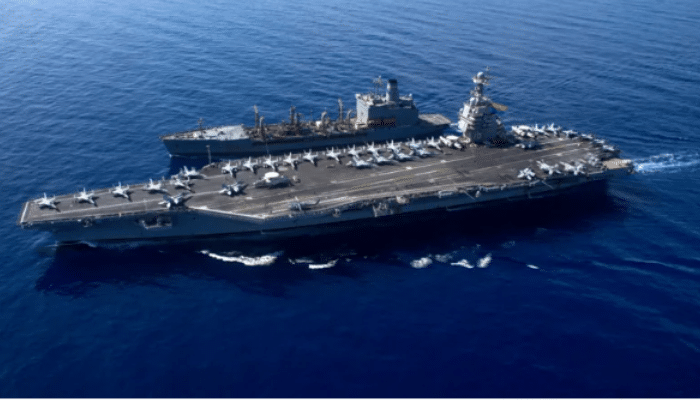
Venezuela’s President Nicolás Maduro has accused the United States of “fabricating a new war” after the USS Gerald R. Ford, the world’s largest aircraft carrier, was sent to the Caribbean. As a result, tensions in the region have spiked, with many fearing a possible confrontation.
USS Gerald R. Ford: Massive Show of Force
The USS Gerald R. Ford can carry up to 90 aircraft and is the largest warship in the world. Moreover, its deployment to the US Southern Command area—which covers Central and South America and the Caribbean—marks a major increase in American military presence.
The Pentagon said the carrier will strengthen US capabilities to disrupt drug trafficking and dismantle transnational criminal networks, according to spokesman Sean Parnell. In addition, the presence of this vessel gives the US more flexibility for potential strikes.
Tensions Between Maduro and the US
President Donald Trump has repeatedly accused Maduro of leading a drug-trafficking organization, a claim Maduro denies. However, many experts believe the military build-up is not only about fighting drugs but also about pressuring Maduro politically.
The US does not recognize Maduro as Venezuela’s legitimate leader. For instance, the 2024 elections were widely criticized as neither free nor fair. Opposition counts suggested their candidate had won by a large margin.
Maduro Condemns US ‘Fabrication of War’
In a televised address, Maduro said the US is planning “a new eternal war”:
“They promised they would never again get involved in a war, and they are fabricating a war.”
Meanwhile, the carrier gives the US the ability to strike ground targets, raising concerns about possible escalation.
Possible Land Operations
Trump has hinted that the US might take action on land, claiming, “we’ve got the sea very well under control.” Furthermore, CNN reports that officials are considering strikes on cocaine facilities and trafficking routes inside Venezuela, though no final decision has been made.
Military experts note that intercepting drugs at sea does not require such a large force. Therefore, some suggest the deployment may serve broader strategic or political purposes.
US Air Strikes and Regional Impact
Since early September, the US has conducted multiple air strikes targeting vessels allegedly involved in drug trafficking. For example, on 10 September, strikes killed six members of the Tren de Aragua, a Venezuelan criminal group listed as a terrorist organization by the US.
These strikes have drawn criticism in the region and raised legal questions. As a result, many argue that Congress should authorize such operations.
Congressional Concerns
Both Democrats and Republicans in Congress have questioned the legality of these strikes. Senator Rand Paul (R-Ky.) and others argue that the president cannot act without approval.
Brian Finucane, a former State Department lawyer, said:
“Congress has principal control over military action. The White House has bypassed that authority, and Congress needs to push back.”
In addition, the debate highlights a potential constitutional crisis over presidential power.
Is This About Regime Change?
Dr. Christopher Sabatini, a senior fellow at Chatham House, suggests the US may be signaling rather than planning an invasion:
“They are likely trying to intimidate Maduro and his inner circle, hoping they turn against him.”
Consequently, the US military presence, combined with strikes that have killed at least 43 people, underscores the tense situation in the Caribbean and Latin America.
